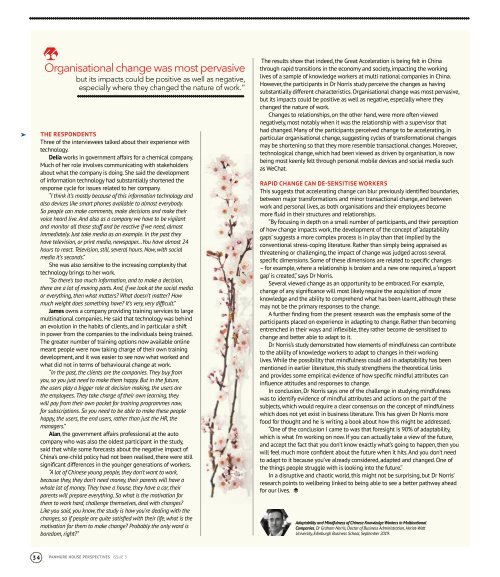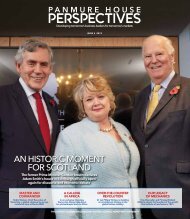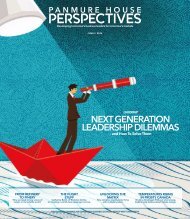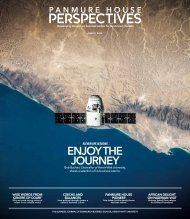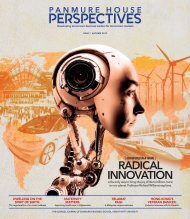Panmure House Perspectives - Issue 5, 2019
Panmure House Perspectives, the new international business journal of Edinburgh Business School, which showcases the best research undertaken by our doctoral students, interviews with major global business figures and viewpoints from leading academics from or own university and beyond.
Panmure House Perspectives, the new international business journal of Edinburgh Business School, which showcases the best research undertaken by our doctoral students, interviews with major global business figures and viewpoints from leading academics from or own university and beyond.
Create successful ePaper yourself
Turn your PDF publications into a flip-book with our unique Google optimized e-Paper software.
INFOGRAPHIC<br />
Organisational change was most pervasive<br />
but its impacts could be positive as well as negative,<br />
especially where they changed the nature of work.”<br />
THE RESPONDENTS<br />
Three of the interviewees talked about their experience with<br />
technology.<br />
Delia works in government affairs for a chemical company.<br />
Much of her role involves communicating with stakeholders<br />
about what the company is doing. She said the development<br />
of information technology had substantially shortened the<br />
response cycle for issues related to her company.<br />
“I think it’s mostly because of this information technology and<br />
also devices like smart phones available to almost everybody.<br />
So people can make comments, make decisions and make their<br />
voice heard live. And also as a company we have to be vigilant<br />
and monitor all those stuff and be reactive if we need, almost<br />
immediately. Just take media as an example. In the past they<br />
have television, or print media, newspaper…You have almost 24<br />
hours to react. Television, still, several hours. Now, with social<br />
media it’s seconds.”<br />
She was also sensitive to the increasing complexity that<br />
technology brings to her work.<br />
“So there’s too much information, and to make a decision,<br />
there are a lot of moving parts. And, if we look at the social media<br />
or everything, then what matters? What doesn’t matter? How<br />
much weight does something have? It’s very, very difficult.”<br />
James owns a company providing training services to large<br />
multinational companies. He said that technology was behind<br />
an evolution in the habits of clients, and in particular a shift<br />
in power from the companies to the individuals being trained.<br />
The greater number of training options now available online<br />
meant people were now taking charge of their own training<br />
development, and it was easier to see now what worked and<br />
what did not in terms of behavioural change at work.<br />
“In the past, the clients are the companies. They buy from<br />
you, so you just need to make them happy. But in the future,<br />
the users play a bigger role at decision making, the users are<br />
the employees. They take charge of their own learning, they<br />
will pay from their own pocket for training programmes now,<br />
for subscriptions. So you need to be able to make these people<br />
happy, the users, the end users, rather than just the HR, the<br />
managers.”<br />
Alan, the government affairs professional at the auto<br />
company who was also the oldest participant in the study,<br />
said that while some forecasts about the negative impact of<br />
China’s one-child policy had not been realised, there were still<br />
significant differences in the younger generations of workers.<br />
“A lot of Chinese young people, they don’t want to work,<br />
because they, they don’t need money, their parents will have a<br />
whole lot of money. They have a house, they have a car, their<br />
parents will prepare everything. So what is the motivation for<br />
them to work hard, challenge themselves, deal with changes?<br />
Like you said, you know, the study is how you’re dealing with the<br />
changes, so if people are quite satisfied with their life, what is the<br />
motivation for them to make change? Probably the only word is<br />
boredom, right?”<br />
The results show that indeed, the Great Acceleration is being felt in China<br />
through rapid transitions in the economy and society, impacting the working<br />
lives of a sample of knowledge workers at multi national companies in China.<br />
However, the participants in Dr Norris study perceive the changes as having<br />
substantially different characteristics. Organisational change was most pervasive,<br />
but its impacts could be positive as well as negative, especially where they<br />
changed the nature of work.<br />
Changes to relationships, on the other hand, were more often viewed<br />
negatively, most notably when it was the relationship with a supervisor that<br />
had changed. Many of the participants perceived change to be accelerating, in<br />
particular organisational change, suggesting cycles of transformational changes<br />
may be shortening so that they more resemble transactional changes. Moreover,<br />
technological change, which had been viewed as driven by organisation, is now<br />
being most keenly felt through personal mobile devices and social media such<br />
as WeChat.<br />
RAPID CHANGE CAN DE-SENSITISE WORKERS<br />
This suggests that accelerating change can blur previously identified boundaries,<br />
between major transformations and minor transactional change, and between<br />
work and personal lives, as both organisations and their employees become<br />
more fluid in their structures and relationships.<br />
“By focusing in depth on a small number of participants, and their perception<br />
of how change impacts work, the development of the concept of ‘adaptability<br />
gaps’ suggests a more complex process is in play than that implied by the<br />
conventional stress-coping literature. Rather than simply being appraised as<br />
threatening or challenging, the impact of change was judged across several<br />
specific dimensions. Some of these dimensions are related to specific changes<br />
– for example, where a relationship is broken and a new one required, a ‘rapport<br />
gap’ is created,’’ says Dr Norris.<br />
Several viewed change as an opportunity to be embraced. For example,<br />
change of any significance will most likely require the acquisition of more<br />
knowledge and the ability to comprehend what has been learnt, although these<br />
may not be the primary responses to the change.<br />
A further finding from the present research was the emphasis some of the<br />
participants placed on experience in adapting to change. Rather than becoming<br />
entrenched in their ways and inflexible, they rather become de-sensitised to<br />
change and better able to adapt to it.<br />
Dr Norris’s study demonstrated how elements of mindfulness can contribute<br />
to the ability of knowledge workers to adapt to changes in their working<br />
lives. While the possibility that mindfulness could aid in adaptability has been<br />
mentioned in earlier literature, this study strengthens the theoretical links<br />
and provides some empirical evidence of how specific mindful attributes can<br />
influence attitudes and responses to change.<br />
In conclusion, Dr Norris says one of the challenge in studying mindfulness<br />
was to identify evidence of mindful attributes and actions on the part of the<br />
subjects, which would require a clear consensus on the concept of mindfulness<br />
which does not yet exist in business literature. This has given Dr Norris more<br />
food for thought and he is writing a book about how this might be addressed.<br />
“One of the conclusion I came to was that foresight is 90% of adaptability,<br />
which is what I’m working on now. If you can actually take a view of the future,<br />
and accept the fact that you don’t know exactly what’s going to happen, then you<br />
will feel much more confident about the future when it hits. And you don’t need<br />
to adapt to it because you’ve already considered, adapted and changed. One of<br />
the things people struggle with is looking into the future.’’<br />
In a disruptive and chaotic world, this might not be surprising, but Dr Norris’<br />
research points to wellbeing linked to being able to see a better pathway ahead<br />
for our lives.<br />
Adaptability and Mindfulness of Chinese Knowledge Workers in Multinational<br />
Companies, Dr Graham Norris, Doctor of Business Administration, Heriot-Watt<br />
University, Edinburgh Business School, September <strong>2019</strong>.<br />
ORIAM<br />
[ SCOTLAND’S SPORTS PERFORMANCE CENTRE AT HERIOT -WATT UNIVERSITY ]<br />
33<br />
33 sports clubs use the Oriam<br />
sports facilities at Heriot-Watt<br />
SPORTING PARTNERS<br />
Netball Scotland<br />
Scottish<br />
Rugby<br />
Scottish<br />
Squash<br />
7<br />
Scottish FA<br />
THE CENTRE, COSTING £33 MILLION, WAS OPENED IN 2016,<br />
AND ONE OF SCOTLAND’S LARGEST INDOOR FACILITIES<br />
Scottish<br />
Handball<br />
Association<br />
Basketball<br />
Scotland<br />
Heart of<br />
Midlothian FC<br />
Indoor synthetic pitch<br />
built to FIFA 2 star and<br />
IRB 22 standards<br />
The indoor pitch boasts a<br />
500<br />
seat spectator<br />
gallery<br />
The main sports hall has a<br />
JUNCKERS SPRUNG<br />
WOODEN FLOOR<br />
3<br />
portable bleacher seats are an<br />
option in the main sports hall<br />
3<br />
FUNDING PARTNERS<br />
The Scottish Government, sportscotland<br />
and Heriot-Watt University<br />
Scottish Premiership club Heart of<br />
Midlothian use Oriam for daily training<br />
10<br />
INTERNATIONAL<br />
ATHLETES<br />
have recently used the facilities including<br />
Greg Laidlaw and Finn Russell of<br />
Scottish Rugby in preparation for the<br />
<strong>2019</strong> Rugby World Cup in Japan<br />
34 PANMURE HOUSE PERSPECTIVES ISSUE 5 ISSUE 5 PANMURE HOUSE PERSPECTIVES 35


